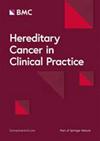Experiences of patients and family members with follow-up care, information needs and provider support after identification of Lynch Syndrome
IF 2.4
4区 医学
Q3 ONCOLOGY
引用次数: 0
Abstract
Lynch Syndrome is among the most common hereditary cancer syndromes and requires ongoing cancer surveillance, repeated screenings and potential risk-reducing surgeries. Despite the importance of continued surveillance, there is limited understanding of patient experiences after initial testing and counseling, the barriers or facilitators they experience adhering to recommendations, and how they want to receive information over time. A cross-sectional, observational study was conducted among 127 probands and family members who had received genetic testing for Lynch Syndrome. We conducted semi-structured interviews to determine proband and family member experiences after receiving genetic testing results including their surveillance and screening practices, information needs, and interactions with health care providers. Both closed-ended and open-ended data were collected and analyzed. Both probands (96.9%) and family members (76.8%) received recommendations for follow-up screening and all probands (100%) and most family members (98.2%) who tested positive had completed at least one screening. Facilitators to screening included receiving screening procedure reminders and the ease of making screening and surveillance appointments. Insurance coverage to pay for screenings was a frequent concern especially for those under 50 years of age. Participants commented that their primary care providers were often not knowledgeable about Lynch Syndrome and surveillance recommendations; this presented a hardship in navigating ongoing surveillance and updated information. Participants preferred information from a knowledgeable health care provider or a trusted internet source over social media or support groups. Probands and family members receiving genetic testing for Lynch Syndrome generally adhered to initial screening and surveillance recommendations. However, factors such as insurance coverage and difficulty finding a knowledgeable healthcare provider presented barriers to receiving recommended follow-up care. There is an opportunity to improve care through better transitions in care, procedures to keep primary care providers informed of surveillance guidelines, and practices so that patients receive reminders and facilitated appointment setting for ongoing screening and surveillance at the time they are due.患者和家属在发现林奇综合征后在后续护理、信息需求和提供者支持方面的经验
林奇综合征是最常见的遗传性癌症综合征之一,需要持续的癌症监测、反复筛查和潜在的降低风险手术。尽管持续监测非常重要,但人们对患者在初次检测和咨询后的经历、他们在坚持建议方面遇到的障碍或促进因素以及他们希望随着时间的推移如何获得信息等方面的了解却很有限。我们对 127 名接受过林奇综合征基因检测的患者及其家属进行了横断面观察研究。我们进行了半结构化访谈,以了解受检者及其家庭成员在收到基因检测结果后的经历,包括他们的监测和筛查方法、信息需求以及与医疗服务提供者的互动。我们收集并分析了封闭式和开放式数据。受试者(96.9%)和家庭成员(76.8%)都收到了后续筛查的建议,所有检测结果呈阳性的受试者(100%)和大多数家庭成员(98.2%)都完成了至少一次筛查。促进筛查的因素包括收到筛查程序提醒以及筛查和监测预约的便利性。支付筛查费用的保险范围是一个经常受到关注的问题,尤其是对于 50 岁以下的人群。参与者评论说,他们的初级保健提供者通常不了解林奇综合征和监测建议;这给持续监测和更新信息带来了困难。与社交媒体或支持团体相比,参与者更愿意从知识渊博的医疗服务提供者或可信的互联网来源获得信息。接受林奇综合征基因检测的患者及其家庭成员一般都会遵守最初的筛查和监测建议。但是,保险范围和难以找到知识渊博的医疗服务提供者等因素阻碍了他们接受建议的后续治疗。我们有机会通过更好的护理过渡、让初级保健提供者了解监测指南的程序以及让患者在到期时收到持续筛查和监测的提醒和便利的预约安排来改善护理。
本文章由计算机程序翻译,如有差异,请以英文原文为准。
求助全文
约1分钟内获得全文
求助全文
来源期刊
CiteScore
3.10
自引率
5.90%
发文量
38
审稿时长
>12 weeks
期刊介绍:
Hereditary Cancer in Clinical Practice is an open access journal that publishes articles of interest for the cancer genetics community and serves as a discussion forum for the development appropriate healthcare strategies.
Cancer genetics encompasses a wide variety of disciplines and knowledge in the field is rapidly growing, especially as the amount of information linking genetic differences to inherited cancer predispositions continues expanding. With the increased knowledge of genetic variability and how this relates to cancer risk there is a growing demand not only to disseminate this information into clinical practice but also to enable competent debate concerning how such information is managed and what it implies for patient care.
Topics covered by the journal include but are not limited to:
Original research articles on any aspect of inherited predispositions to cancer.
Reviews of inherited cancer predispositions.
Application of molecular and cytogenetic analysis to clinical decision making.
Clinical aspects of the management of hereditary cancers.
Genetic counselling issues associated with cancer genetics.
The role of registries in improving health care of patients with an inherited predisposition to cancer.

 求助内容:
求助内容: 应助结果提醒方式:
应助结果提醒方式:


